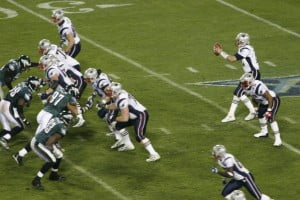By now, football fans know that a federal court has just ruled on “Deflategate,” nullifying National Football League Commissioner Roger Goodell’s arbitration decision upholding New England Patriots quarterback Tom Brady’s four-game suspension. So, what’s next? Having read judge Berman’s 40-page decision, let me offer this very quick and high level analysis.
Background
I’ve previously blogged on the NFL’s appeals process and on “Deflategate.” Cases like this are governed by Article 46 of the Collective Bargaining Agreement between the NFL and the players’ union, the NFL Players Association (“NFLPA”), which states in section 1(a):
All disputes involving a fine or suspension imposed upon a player for conduct on the playing field (other than as described in Subsection (b) below) or involving action taken against a player by the Commissioner for conduct detrimental to the integrity of, or public confidence in, the game of professional football, will be processed exclusively as follows: the Commissioner will promptly send written notice of his action to the player, with a copy to the NFLPA. Within three (3) business days following such written notification, the player affected thereby, or the NFLPA with the player’s approval, may appeal in writing to the Commissioner.
Section 2(a) provides:
For appeals under Section 1(a) above, the Commissioner shall, after consultation with the Executive Director of the NFLPA, appoint one or more designees to serve as hearing officers… Notwithstanding the foregoing, the Commissioner may serve as hearing officer in any appeal under Section 1(a) of this Article at his discretion.
Sitting as the “final arbiter” of disciplinary matters, the Commissioner upheld Brady’s four-game suspension.
The Court’s Decision: What it addressed
The Federal Arbitration Act, 9 U.S.C. §§ 1 et seq., provides that an arbitration decision – called an award – may be enforced in court. It may also be challenged on very limited grounds. The NFL went to court to enforce the Commissioner’s decision, and the Players’ Association sought to vacate it. The Deflategate court vacated the Commissioner’s arbitration award based on arbitrator misconduct (Federal Arbitration Act, 9 U.S.C§ 10(a)(3)). This section states that an award can be vacated where “the arbitrators were guilty of misconduct in refusing to postpone the hearing, upon sufficient cause shown, or in refusing to hear evidence pertinent and material to the controversy…”
Specifically, the Court held that the Commissioner-Arbitrator improperly denied Brady: 1) “the opportunity to examine designated co-lead investigator Jeff Pash;” and 2)”equal access to investigative files.”
The Court’s Decision: What it didn’t address
The Court did not address the remaining issues because it had enough to vacate the award. One glaring issue not addressed was the Commissioner’s ability to serve as a neutral arbitrator, which the Court notes was “central” and “at the very heart” of Brady’s challenge. The Federal Arbitration Act provides that an arbitration decision may be challenged under section 10(a)(2) for “evident partiality” of the arbitrator. And some Courts have held that the Commissioner cannot serve as neutral arbitrator (see my blog post on the subject).
Why this is Important: think Groundhog Day the Movie
I suspect the judge was trying to side-step the arbitrator bias issue to avoid disrupting the parties’ disciplinary system, but in my opinion he made a mistake. Why? All the Court’s decision means is that the Commissioner’s decision is nullified, and Brady gets a “do-over.” There may yet be another arbitration, but the Court’s decision does not address who will serve as arbitrator. So, the question still remains: who gets to be the arbitrator? Like the Bill Murray movie “Groundhog Day,” Brady, the union, and the NFL may find themselves reliving this process again and again.
*George H. Friedman, an ADR consultant and Chairman of the Board of Directors of Arbitration Resolution Services, Inc., retired in 2013 as FINRA’s Executive Vice President and Director of Arbitration, a position he held from 1998. In his extensive career, he previously held a variety of positions of responsibility at the American Arbitration Association, most recently as Senior Vice President from 1994 to 1998. He is an Adjunct Professor of Law at Fordham Law School. Mr. Friedman serves on the Board of Editors of the Securities Arbitration Commentator. He is also a member of the AAA’s national roster of arbitrators. He holds a B.A. from Queens College, a J.D. from Rutgers Law School, and is a Certified Regulatory and Compliance Professional (Wharton-FINRA Institute).







